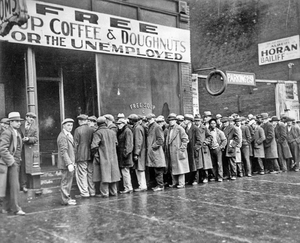More languages
More actions
ComradeTrash (talk | contribs) (Created the page, added an elementary introduction, a short description of the purpose of unemployment and an image of a soup kitchen to depict it.) Tag: Visual edit |
ComradeTrash (talk | contribs) m (Fixed repeated word) Tag: Visual edit |
||
| Line 1: | Line 1: | ||
[[File:Soup Kitchen, Chicago.webp|thumb|During the great depression (1929-1939), unemployment was at an all time high. Structures such as this soup kitchen in Chicago were set up to deal with an ever growing mass of hungry unemployed workers.]] | [[File:Soup Kitchen, Chicago.webp|thumb|During the great depression (1929-1939), unemployment was at an all time high. Structures such as this soup kitchen in Chicago were set up to deal with an ever growing mass of hungry unemployed workers.]] | ||
'''Unemployment''' is the condition where an individual is seeking employment but cannot find work anywhere. Unemployment since the industrial revolution has served the purpose of providing the bourgeoisie with a reserve army of labour. This reserve can be | '''Unemployment''' is the condition where an individual is seeking employment but cannot find work anywhere. Unemployment since the industrial revolution has served the purpose of providing the bourgeoisie with a reserve army of labour. This reserve can be quickly deployed to work in rapidly expanding markets, or, alternatively, it can be kept as a threat to employed workers, in order to maintain low wages.<ref>{{Citation|author=Karl Marx|year=1867|title=Capital Volume One|chapter=Chapter Twenty-Five: The General Law of Capitalist Accumulation|chapter-url=https://www.marxists.org/archive/marx/works/1867-c1/ch25.htm#S3|section=Section 3}}</ref> | ||
Revision as of 14:24, 26 May 2023

Unemployment is the condition where an individual is seeking employment but cannot find work anywhere. Unemployment since the industrial revolution has served the purpose of providing the bourgeoisie with a reserve army of labour. This reserve can be quickly deployed to work in rapidly expanding markets, or, alternatively, it can be kept as a threat to employed workers, in order to maintain low wages.[1]
- ↑ Karl Marx (1867). Capital Volume One: 'Chapter Twenty-Five: The General Law of Capitalist Accumulation; Section 3'.
